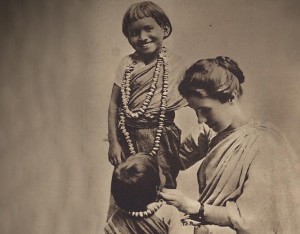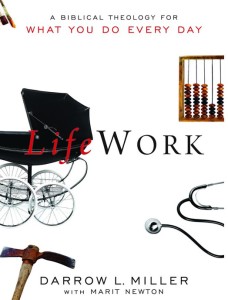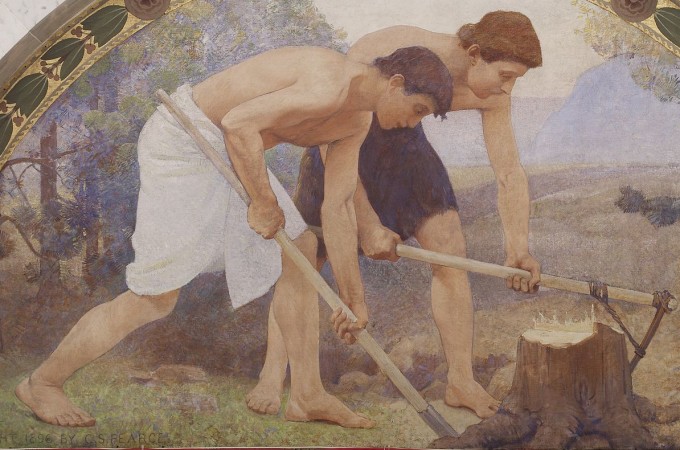One of the heroes of our faith, the missionary stateswoman to India, Amy Carmichael, has captured the relationship between God’s work and our work. In Amma: The Life and Words of Amy Carmichael, author Elizabeth R. Skoglund quotes from Carmichael. Here is an excerpt of Amy’s words and the corresponding quote from scripture:
What is your work? Whatever it be, the Lord, the King, has done that kind of work Himself, and you dwell with Him here for His work….
Is your work to ‘mother,’ comfort and strengthen? (‘Gentle as a mother is when she tenderly nurses her own children.’ I Thess. 2.7, Weymouth.) “As one who his mother comforteth, so will I comfort you, saith the Lord….”
Is your work in the sewing-room? “Unto Adam also and to his wife did the Lord God make coats of skin, and clothed them….”
Is your work cooking, lighting fires in the kitchen in the early morning, getting food ready for others? “When the morning was now come, Jesus stood on the shore; but the disciples knew not that it was Jesus. As soon then as they were come to land, they saw a fire of coals there, and fish laid thereon, and bread. Jesus saith unto them, Come this way and have breakfast.” (John 21.12, Weymouth.)….
Is your work nursing, bandaging sores? “He healeth the broken in heart, and bindeth up their wounds….”
Is your work account-keeping, teaching or learning arithmetic, or the names of things hard to remember? “He telleth the number of the stars; He calleth them all by their names. Even the very hairs of your head are all numbered….”
Is your work in the farm with the animals? “He shall feed His flock like a shepherd: He shall gather the lambs with His arm, and carry them in His bosom….”
He has done the work that you are doing. You dwell here with the King for His work.”[i]
God has already done the work you are doing!
As Amy Carmichael recognized, God has done the work we are doing. God provides us with a principled archetype for all morally legitimate vocations. He was the First Farmer,[2] the Divine Healer,[3] the Water Engineer,[4] the Accountant,[5] the Investor/Entrepreneur.[6] God’s nature is modeled and manifest in Christ through the Scriptures. Christ is the communicator, the agriculturalist, the construction worker, the healer, and the businessman. The most extraordinary human being of all time, Jesus of Nazareth, infused dignity into what the world calls menial. He gloried in and glorified the ordinary.
New Testament scholar and author Paul S. Minear (1906–2007) writes of the impact of the God of the universe incarnating himself in the flesh of a humble carpenter:
One effect of this was to give workers in all trades a genuine equality before God and genuine importance in the life of the community….No menial work was in itself beneath the dignity of prophet, priest, or king. In fact, God chose an obscure shepherd boy as king and an unheralded carpenter as Messiah.[7]
 Dallas Willard also captures the essence of Christ and vocation:
Dallas Willard also captures the essence of Christ and vocation:
If he were to come today as he did then, he could carry out his mission through most any decent and useful occupation. He could be a clerk or accountant in a hardware store, a computer repairman, a banker, an editor, doctor, waiter, teacher, farmhand, lab technician, or construction worker. He could run a housecleaning service or repair automobiles.
In other words, if he were to come today he could very well do what you do. He could very well live in your apartment or house, hold down your job. [8]
Christ wants to inhabit the world through his people, in the place where they live and work. As a Christian, I am not discipled to do “spiritual things” either as a higher calling or to supplement my “secular work.” No, I am to learn to live all of my life the way that Jesus would want it to be lived, in the house and in the vocation where he has deployed me. Again, Dallas Willard has captured this sense:
I am learning from Jesus to live my life as he would live my life if he were I. I am not necessarily learning to do everything he did, but I am learning how to do everything I do in the manner that he did all that he did.[9]
The God of the universe walked in the garden with our first parents, Adam and Eve. He commanded Moses to build a tabernacle, because he wanted to “dwell among” his people.[10] In Christ, “the Word became flesh and made his dwelling among us.”[11] Now he wants to dwell among the nations, through his church.[12] I am to learn from Jesus how he would live my life, so that he would be substantially present in the place of my work and the place where I live. I am to occupy the territory and time of my life for Jesus Christ.
from LifeWork: A Biblical Theology For What You Do Every Day by Darrow Miller
[1] Elizabeth R. Skoglund, Amma: The Life and Words of Amy Carmichael (Grand Rapids: Baker Books, 1994), 110–112.
[2] Gen. 2:9.
[3] Exod. 15:26.
[4] Gen. 1:6–9.
[5] Deut. 25:13–16.
[6] Luke 19:12–13, 15.
[7] Paul S. Minear, “Work and Vocation in Scripture,” in Work and Vocation: A Christian Discussion, ed. John Oliver Nelson (New York: Harper, 1954), 32–83.
[8] Willard, The Divine Conspiracy, 14.
[9] Ibid., 283.
[10] Exod. 25:8.
[11] John 1:14.
[12] Matt. 28:19–20; John 17:15–18; Eph. 2:22.






